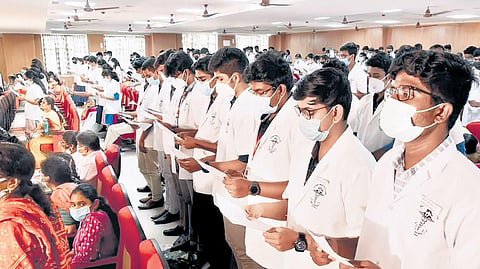An oath that breaks tradition
The Students’ Council of Madurai Medical College has accepted responsibility for having taken the Charak Shapath, an ancient Ayurvedic text, rather than the customary Hippocratic Oath, at a white coat ceremony this week. Earlier, the institution’s Dean had been removed from his position following this controversial action. The Council has clarified its role in the proceedings, pointing to a National Medical Commission recommendation about replacing the Oath.
When the NMC made its recommendation in February, it was opposed by many medical practitioners, as well as by the Indian Medical Association. Reasons for this ranged from bigoted phrases in the text, to the dangers of bringing elements from unregulated practices into the clinically proven modern medical system.
The Madurai Medical College students say they found the CharakShapath online and took it in English, not the original Sanskrit. English is probably, if not definitely, the language of instruction at their institution. The students were cognisant of what they were reciting.
The text does not seem to be on the NMC website. An abridged version on one media website was arguably more secular and progressive than the translation of the ancient Greek Hippocratic oath shared alongside, which begins with a pledge to the deities Apollo, Asclepius, Hygieia and Panacea and more alarmingly has a line about refusing abortions. That hit a nerve, now that the USA may revoke this fundamental right, as a leak from within its Supreme Court has just revealed. There are challenges to human rights within the medical context everywhere.
But the 1947 translation of the CharakShapath by the Shree Galabkuverba Ayurvedic Society of Jamnagar, available on Wikipedia, made its problematic nature clear. Absolute allegiance to the guru’s demands, reverence to Brahmins, the notion of women as property who must be accompanied and denial of treatment to those who oppose rulers are among its tenets.
Which version of the CharakShapath did the students take, and how do they feel about what they’ve promised? All ethical commitments reflect either the mores of those in power, or of those who seek to heal honourably. The Hebrew Oath of Asaph is more like the CharakSampath in its regressiveness, whereas the Pali Vejjavatapada is more practical in nature.
It also turns out that modern usage of the Hippocratic Oath excises much of what was outdated. A 1964 version by Louis Lasagna of the School of Medicine at Tufts University is popular. As far as complete alternatives go, the University of Minnesota’s Medical School pledge is reasonably worded. The World Medical Association’s Declaration of Geneva was first created in 1948 and has been amended numerous times, evolving to be more inclusive, even as recently as 2017. In allied professions, the Veterinarian’s Oath and the Nightingale Pledge for nurses were created in the 20th century and have been rephrased to suit new generations.
These texts are crafted and renewed so that their speakers can feel good about saying them. There is no reason why Indian physicians-to-be should not have the same. True ethics can only be observed in action, but inspiration to abide by them — relevant, unprejudiced inspiration — can be imparted, both ceremonially and in constant practice.
Sharanya Manivannan
@ranyamanivannan
The columnist is a writer and illustrator

